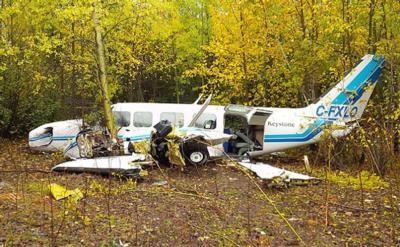Thu, Sep 08, 2016
Plane With Eight On Board Went Down Shortly After Takeoff
A Transportation Safety Board of Canada (TSB) investigation report (A15C0134) released Tuesday shows that the use of an incorrect fuel type led to a forced landing in a forest near Thompson, Manitoba, in September 2015. The occupants sustained varying serious injuries.

According to the report, on September 15, 2015 at 1817 Central Daylight Time, a Keystone Air Service Ltd. (Keystone) Piper PA-31-350 departed Thompson Airport on an instrument flight rules flight to Winnipeg/James Armstrong Richardson International Airport with two pilots and six passengers on board. Shortly after takeoff, both engines began to lose power. The crew attempted to return to the airport, but the aircraft was unable to maintain altitude. The landing gear was extended in preparation for a forced landing on a highway southwest of the airport. However, because of vehicle traffic, the crew chose to conduct the forced landing in a forested area next to the highway.
The investigation found that the aircraft had been fueled with the incorrect type of aircraft fuel. The piston-engined Piper PA-31-350 requires AVGAS, but it was refuelled with Jet-A1 fuel, which is used for gas turbine engines. The incorrect fuel caused a loss of power from both engines, and made it necessary for the crew to conduct a forced landing. A number of defenses implemented to prevent such fuelling errors failed. In particular, a flared spout, meant for use on Jet-A1 fuel filler openings, was replaced with a spout to enable the delivery of Jet-A1 fuel into the PA-31's smaller fuel tank openings. The fuelling operations were also not adequately supervised by the flight crew, and the fuel slip indicating that Jet-A1 fuel had been delivered was not available for their review.
Following the occurrence, an urgent memo by Keystone's management was circulated to all its pilots, reiterating the importance of crew supervision of aircraft fuelling in compliance with the company's operations manual.
A post-accident inspection conducted by Transport Canada (TC) revealed safety concerns that resulted in the suspension of Keystone's air operator certificate. TC subsequently conducted an in-depth review of Keystone's aviation safety record and cancelled its air operator certificate, citing public interest and the company's aviation safety record.
(Source: TSB news release. Image contained in report)
More News
Aero Linx: Transport Canada We are a federal institution, leading the Transport Canada portfolio and working with our partners. Transport Canada is responsible for transportation p>[...]
Gross Navigation Error (GNE) A lateral deviation from a cleared track, normally in excess of 25 Nautical Miles (NM). More stringent standards (for example, 10NM in some parts of th>[...]
From AirVenture 2017 (YouTube Edition): Flight-Proven Booster On Display At AirVenture… EAA AirVenture Oshkosh is known primarily as a celebration of experimental and amateu>[...]
Aircraft Parachute System (CAPS) Was Deployed About 293 Ft Above Ground Level, Which Was Too Low To Allow For Full Deployment Of The Parachute System Analysis: The day before the a>[...]
Also: 48th Annual Air Race Classic, Hot Air Balloon Fire, FAA v Banning 100LL, Complete Remote Pilot The news Piper PA-18 Super Cub owners have been waiting for has finally arrived>[...]
 ANN's Daily Aero-Linx (06.29.25)
ANN's Daily Aero-Linx (06.29.25) ANN's Daily Aero-Term (06.29.25): Gross Navigation Error (GNE)
ANN's Daily Aero-Term (06.29.25): Gross Navigation Error (GNE) Classic Aero-TV: Anticipating Futurespace - Blue Origin Visits Airventure 2017
Classic Aero-TV: Anticipating Futurespace - Blue Origin Visits Airventure 2017 NTSB Final Report: Cirrus SR22
NTSB Final Report: Cirrus SR22 Airborne Affordable Flyers 06.26.25: PA18 Upgrades, Delta Force, Rhinebeck
Airborne Affordable Flyers 06.26.25: PA18 Upgrades, Delta Force, Rhinebeck



